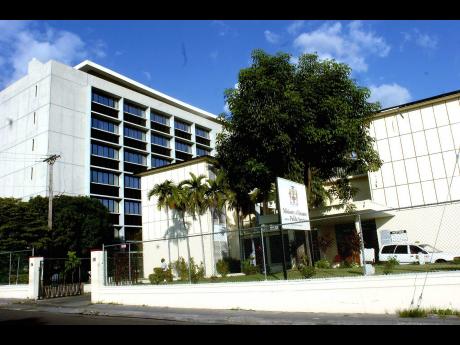No worries although primary surplus lags budget
Jamaica produced a primary surplus of $69.4 billion for the 10 months to January 2016, short of the International Monetary Fund (IMF) target by $1.6 billion, but that is forecast to be corrected when data for February becomes available.
"We are a little behind on the primary surplus, but I don't think, to an extent, that need worry us too much," said Richard Byles, co-chairman of the Economic Programme Oversight Committee (EPOC), noting that the Ministry of Finance has given us the assurance that the Government restrained expenditure in February - ironically the month in which the general election was held - to bring recurrent expenditure back in line with the budget.
"So I expect that the small $1.6 billion difference between the primary balance actual and Budget will not be a problem for us, and come February, (that is, when data for that month is available), we will see that disappear. I certainly hope that is so," Byles told a press briefing at Sagicor Life Jamaica, New Kingston, where he released the 34th communiquÈ of EPOC yesterday.
The primary balance was budgeted at $71 billion for the 10 months to January, and just over $120 billion for fiscal year 2015-16.
The net international reserves (NIR) at the end of February stood at US$2.23 billion, well in excess of the IMF target of US$1.61 billion for the end of March.
The primary balance and the NIR are key quantitative performance criteria under Jamaica's four-year economic support programme with the IMF.
Revenues and grants for the first 10 months of fiscal year 2015-16 were $970 million, or 0.3 per cent, behind budget, despite continued good performance from tax revenues, which were $3.8 billion, or 1.2 per cent, above the $319.6 billion budget, Byles said.
Tax of interest for the review period performed better by $2.6 billion, company tax by $2 billion, special consumption tax by $1.6 billion, and general consumption tax by $1 billion, while customs duty, tax on dividends and telephone tax underperformed by $1.1 billion, $0.9 billion, and $0.6 billion, respectively.
Collection of grants, $3.2 billion below budget, and bauxite levy, $2 billion below, contributed to an overall shortfall of $1 billion for the 10-month period.
Expenditure for the fiscal year to January was $1.6 billion above budget. Recurrent expenditure was $2.8 billion over budget, mainly accounted for by an over-expenditure of $3.7 billion on wages as a result of negotiations with the trade unions, as well as on programmes.
Capital expenditure of $26.5 billion was $1.2 billion below budget.
Byles also provided data from the Planning Institute of Jamaica (PIOJ) which show the estimated growth in real gross domestic product (GDP) of 0.6 per cent in the October to December 2015 quarter.
The PIOJ also estimated that for calendar year 2015 growth in real GDP is estimated at 0.8 per cent.
"The PIOJ estimate of growth of 0.8 per cent for 2015 is a little disappointing but better than the 0.5 per cent in 2014," said Byles.
Referring to the Jamaica Labour Party Government which was propelled to office following general elections last month, Byles said:
"The efforts of this administration to spur growth is welcomed, and we certainly hope that it bears the fruit that I think every Jamaican wants to see it do because we certainly need it to spur us past the 1.0 per cent which seems to be a serious barrier for us to get over into the two per cent, three per cent, which is where your lens start to see and feel job creation."
He also mentioned data from the Bank of Jamaica which show that private sector credit increased by 9.6 per cent over the 12 months to December 2015, noting that it was an indication that private-sector investment was picking up.
"The taxes continue to perform very strongly, and that is the good news. I expect also that we will easily surpass the NIR target for March, so in that respect, we are in good condition," said Byles, in his outlook on the economy.
The communiquÈ, issued by the non-public sector members of EPOC, said "the economic foundation, having been stabilised, needs to have a continued push and strong collaborative effort to identify and attract private investments in projects that can lead to meaningful growth".
It added that "this is critical to the sustainability of the overall economic programme. We note that the new administration's focus on this, with the establishment of the ministry for job creation and growth, and hope that these efforts will produce the desired results".

